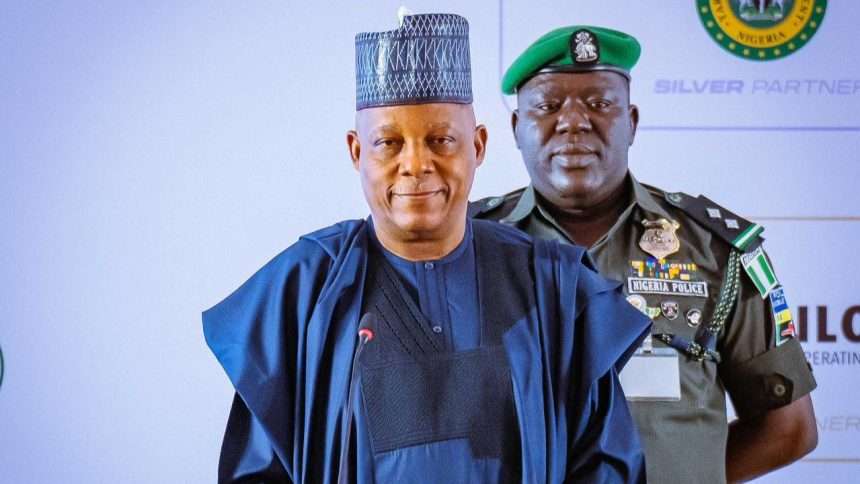It was more than just a book launch. It became a gathering of Nigeria’s political heavyweights, and a solemn reflection on justice, power, and redemption.
Vice President Kashim Shettima led the dignitaries who turned out for the public presentation of book “OPL 245: Inside Story of the $1.3BN Nigerian oil block”, a personal account by former Attorney-General of the Federation, Mohammed Bello Adoke.
At the heart of the Federal Capital Territory, Abuja power bowed to posterity as Vice President Shettima took the stage not just to represent the Presidency, but to reflect on history, pain, and
reconciliation.
The Vice President reflected on how, as Governor of Borno State, President Goodluck Jonathan once attempted to remove him from office, a move he said was halted by the intervention of Bello Adoke and then Speaker of the House of Representatives, Aminu Tambuwal, but yoday, both men have since buried the hatchet.
With voices from across political divides and dignitaries such as former Kano Governor, Rabiu Kwankwaso, former Kaduna Governor Nasir El-Rufai and one-time Kwara Governor and former President of the Senate, Bukola Saraki. In a rare bipartisan atmosphere, the gathering brought together voices from both past and present administrations, serving and former members of the National Assembly, governors, ministers, and legal minds.
Oyo Governor, Seyi Makinde, who served as Chief Presenter, did not mince words. He reminded the country that the oil block at the centre of the Malabo scandal holds an estimated nine billion barrels of crude oil, enough to shift Nigeria’s Gross Domestic Product, GDP. But he insisted that the real issue was not just about oil, but about how Nigeria administers its resources.
For Adoke, the book, “OPL 245: Inside Story of the $1.3BN Nigerian oil block” was not a vendetta, it was vindication. With calm resolve, he recalled his years in exile, the raid on his apartments in both Nigeria and the Netherlands, his 55 days in EFCC detention, and the long legal battle that ended in acquittal after eight harrowing years.
“I do not set out to denigrate anyone. But no public officer should be persecuted under the guise of prosecution. The scars are real. The pain is real. But I forgive them all.” He revealed that former EFCC boss, Ibrahim Magu, had since apologised. But Adoke urged him to extend that apology to others who were wronged. “Prosecutors must not become persecutors. No matter the pressure, the law must remain sacred.”
Saraki while describing the impact of the scars of the ordeal encouraged public servants to document their experience in office for posterity. “When you’re in government, be transparent. The scars of public service can live on, even after you’re gone. And sometimes, your children are left to bear the burden.”
In a moment of unexpected introspection, El-Rufai appealed to those in power to remember that their own day of reckoning will come. He noted Adoke’s critical role in convincing President Jonathan to concede the 2015 election, a decision that helped Nigeria avert a political crisis.
Representing former President Jonathan at the event, one-time President of the Senate and former Secretary to the Government of the Federation, Anyim Pius Anyim echoed a profound truth: that power belongs to God.
Former Presidential spokesperson, Reuben Abati, who reviewed the book, traced the politicisation of Adoke’s ordeal back to former President Olusegun Obasanjo, highlighting how personal vendettas can derail national integrity.
The Minister of Science, Uche Nnaji, added his voice to the call for integrity and courage in public service.
The author’s story, as many agreed, is one of the most scrutinised petroleum transactions in Nigeria’s history, one that revealed the fault lines between truth, power, and media manipulation.
From power to persecution, and finally to peace and what the author described as waste of resources in chasing him for eight years, Bello Adoke’s story is one that forces the country to ask, who really shortchanged Nigeria?
(Editor: Terverr Tyav)








